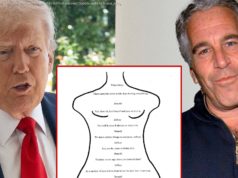The president has taken a prerogative intended to temper justice with mercy, and turned it into an instrument of the culture war.
Beyond President Trump’s prolific dishonesty and extensive use of social media, it’s difficult to forecast what his administration’s enduring legacies may be for the presidency. But it’s becoming ever more likely that his innovative use of the pardon power will be one.
On Thursday, President Trump announced ( on Twitter, of course) that he will pardon Dinesh D’Souza, the conservative writer convicted in 2014 of campaign-finance fraud. D’Souza illegally pushed donations to a Senate candidate, asking friends to donate and then reimbursing them, contravening limits on giving.
It’s Trump’s fifth pardon of his short presidency, and the third to go to a conservative cause célèbre, after former Maricopa County Sheriff Joe Arpaio and Dick Cheney aide Scooter Libby. Other presidents have used pardons to send political messages, as when Jimmy Carter pardoned Vietnam War draft dodgers or Andrew Johnson pardoned Confederates; or to help out cronies, as when Bill Clinton pardoned financier Marc Rich, a major donor who was on the run from prosecution. Other presidents have also tended to wait until the end of their terms to grant high-profile pardons.
Trump’s innovation is to turn the pardon into an everyday tool of culture war, wedding the political messaging of Carter and Johnson to the individualist cronyism of Clinton. As with so many of Trump’s maneuvers, this is entirely within the legal bounds of his power but still largely outside the realm of propriety and precedent. In addition to the possible implications that Trump’s pardons have for the investigation into collusion with Russia—critics worry he’ll use them to obstruct prosecution—his methods of wielding the pardon power are likely to have long-ranging effects. New executive powers, once unsheathed, are seldom and only slowly reversed. That means the pardon could become a workaday tool of political combat in future administrations, too.
While the pardon power retains an aura of sacred mercy, reaching back to its legal antecedents among Anglo-Saxon monarchs who ostensibly ruled as divine regents, there are records of abuse as far back as the Norman period. Even so, Trump’s decisions so far have been notable, especially for the nature of the crimes committed by those he has pardoned. The president has granted mercy to prominent conservatives more or less off the cuff, circumventing the standard application process through the Justice Department, in some cases undermining the rule of law with these moves.
Take D’Souza, a former contributor to The Atlantic. As Mark Stricherz chronicled here in 2014, D’Souza traversed a path from being a learned if pugilistic conservative thinker to being, to be blunt, a crank, frequenting Alex Jones’s radio show. An outspoken social conservative, he was deposed as president of a Christian college over an alleged extramarital affair. He wrote a book claiming that the anticolonialism of Barack Obama Sr. explained his son’s presidency, and while the book was filleted as sloppy and error-ridden, it won him a new audience on the conspiratorial right, eventually producing a popular, though similarly error-ridden, film called 2016: Obama’s America .
It was also during the Obama years that D’Souza was prosecuted for his campaign-finance crimes, and sentenced to five years of probation. Though he did not dispute the underlying evidence in his case, D’Souza has claimed all along that the prosecution was politically motivated, and asked a federal judge to dismiss the case against him. She rejected it, saying, “The defendant’s claim of selective prosecution, legally speaking, is ‘all hat, no cattle.’” Trump, nonetheless, claimed Thursday that D’Souza was “treated very unfairly by our government,” echoing the president’s own claims of persecution at the hands of federal judges.
Before D’Souza was Libby, who had been chief of staff to Cheney and was convicted of obstruction of justice, perjury, and making false statements in connection with the leak of the name of a covert CIA employee during the Bush years. Libby has always had defenders, who say he was a fall man and did not deserve to be convicted. President George W. Bush commuted Libby’s sentence, but did not pardon him, reportedly creating a lasting schism with Cheney, who wanted Libby pardoned. In pardoning him in April, Trump used similar language to his tweet about D’Souza. “I don’t know Mr. Libby, but for years I have heard that he has been treated unfairly,” he said.
Even more than D’Souza or Libby, Trump’s pardoning of Arpaio was a shocking use of the power. The former sheriff of Maricopa County, Arizona—famous for his racist rhetoric, disparate racial enforcement of laws, and immigrant camps—had been convicted of contempt of court in summer 2017. Trump’s pardon was troubling for several reasons, including the fact that he effectively excused Arpaio for thumbing his nose at federal judges—the same bugaboo as the D’Souza case. My colleague James Fallows noted another problem: “While he is not the first official whose offense involved abuse of public powers—from Nixon on down, others fit that category—his is the first case I’m aware of where someone is pardoned for using state power toward racist ends.”
There was severe backlash to the Arpaio decision, not only from liberals and from immigrant advocates, but also from conservative lawyers and scholars, who saw it as an affront to the rule of law. Even the conservative criticism had little effect, however: Trump had long disregarded those voices, and in any case, it should be clear that trampling on the rule of law is a feature and not a bug for Trump.
Even Trump’s less controversial pardons have been peculiarly high profile. Last week, he pardoned Jack Johnson, the late heavyweight boxing champion who was the victim of a racist prosecution. He also pardoned Kristian Saucier, a Navy sailor convicted of unlawful retention of defense information, though he has confusingly employed Saucier as a political prop in his snipes at former FBI Director James Comey.
The timing of Trump’s high-profile pardons, so early in his term, has earned them additional scrutiny. Some observers have seen them as political messaging related to the probes into Russian interference in the election, a method of telegraphing to friends and aides who are ensnared that the president is willing to use his pardon power to help them escape legal issues. It is true that the offenses involved in the D’Souza, Libby, and Arpaio pardons parallel the troubles facing some of his former associates: Fixer Michael Cohen is suspected of campaign-finance violations; several former aides have already pleaded guilty to making false statements; Trump himself is being investigated for obstruction of justice.






